Roma Khetarpal's Blog, page 11
May 31, 2018
College Kids and Curfews

Thanksgiving of 2009. My kids were home from school. It was my son’s first time home as a freshman in college and my daughter’s last time at home as a senior. I had plenty to be grateful for! My husband, Harry, and I had full blown “empty nest” syndrome for the few months prior and this Thanksgiving we were truly thankful!
Harry and I were also in the process of updating and perhaps upgrading our curfew rules for my son’s first visit home. Harry reminded me that now that Navin was in college and had already lived many curfew-less nights, the old high school curfew of midnight would be a joke. In fact, he was pushing for the retirement of the curfew altogether! I, however, was not ready for it; after all, the “many college dorms have curfews, too” was my approach. “This transition of ‘child to adult’ should be slow and steady,” I argued.
On the very first night that my kids were home, they both had friends from high school stop by and it was great seeing them reconnect. The next night, my son went to visit some other friends in The Valley and texted me this at about 6:00 p.m.:
“Staying for dinner at Gruber’s.”
“K, great. Thanks for letting me know.” I answered.
At about 9 p.m., he sent me another text:
“Hanging out with the Trail Blazers (high school mascot). Don’t wait up.”
My daughter was busy studying for her upcoming finals and since she was on the quarter system, Thanksgiving was never a true break for her. Her finals were right after the holiday. I chatted with her for a while and as I kissed her goodnight, she asked, as if she was in my head, “So what time is the curfew for Navin? Or is there one?”
I really didn’t want to answer her question because (a) I didn’t have an answer. It was still undecided, and (b) because she never needed one at his age (She was Miss Ultra Responsible) so we never really had been through this before!
“We haven’t changed anything so far and he hasn’t asked yet. So let’s see,” I said, as I walked toward my bedroom. A split second later, I felt a power trip overtake me and I turned back and said to her, with a wink, “He better be home by midnight!”
“Oh, Mother!” she said. “LET’S SEE!” she mocked me, my own words back at me!
I smiled as I walked to my room, wondering what decision my chidult (child-adult) would make on his own. In my heart of hearts, I didn’t expect him to follow any curfew, especially since we had not discussed it.
The Morning After:
Nitasha had her books spread out on the dining table by 9:00 a.m., ready for another study session. Navin walked in, all dressed and ready to hit the gym.
“Good morning, Momma,” his usual greeting.
“Good morning, love. How was last night?” I asked.
“Oh Mom, we had sooooo much fun. Andrew showed up. Snapper had just flown in. There were eight of us Trail Blazers and we just hung out and laughed and laughed. It was amazing!”
“What time did you get home?” I asked as I quickly turned my face toward the stove so they wouldn’t see me giggle. (I already knew when he came home! I was reading in my room until 12:30 while hubby was fast asleep. I walked out at 12:40 to check if my daughter was still studying since the family room lights were still shining into my room and she wasn’t there. She was in her room, out like a light, but she had forgotten to turn the lights off. Just then I heard the garage door open and knew that Navin was home! 12:45 a.m. Not so bad, I thought, as I snuck back into my room).
“Uh.. I was home by midnight, my curfew time. Right, Tash?” he smoothly responded as he touched his sister’s shoulder and made “LIE CONTACT” with her.
Not even flinching and with her head still in her books, she replied, “Yup!”
My insides gasped for breath! I wanted to laugh and cry! Being the mother of a childult is never easy! I was being pushed to transition! He was almost 19. Was it even worth it? I knew if I treated young adults like children, they would push for freedom! I took a deep breath. Drank a big glass of water and heard myself saying, “Now that you’re in college, Love, and I do know you’re responsible enough, let’s retire your curfew. What do you say?”
He actually scooped me off my feet and swirled me around with a few hundred thank yous and said, “Just for that: I got home at 12:45 and Nitasha was not awake.”
“I know,” I told him matter-of-factly with eyebrows raised, “I’m yo momma!” We all burst out laughing!
The truth is that I did not know if he was responsible enough yet. I didn’t know if he made the right day-to-day decisions. I didn’t even know if he made it to class on time. What I did know was that it was time for me NOT to know it all or SEE it all. It was time to let go. It was time to just watch and stand by and to let him figure it out on his own, just as I had with my daughter. It was definitely a better option than having my chidult and my adult (she was 21 by now!) resort to lie contact!
What I also knew (which is probably the most gratifying part for all parents) was that my adult kids would stick up for each other when needed. Obviously, my daughter had put the curfew issue in perspective before I did and took her stance to support him. Knowing that they would be there for each other; now THAT felt really good!
To sum it up, LIE CONTACT between siblings might not be that bad after all, at least in this case!
If you’d like to be updated on new blog posts and events, we’d love for you to sign up for our mailing list.
The post College Kids and Curfews appeared first on Tools of Growth.
May 25, 2018
Do You Spend Quality Time With Your Kids?
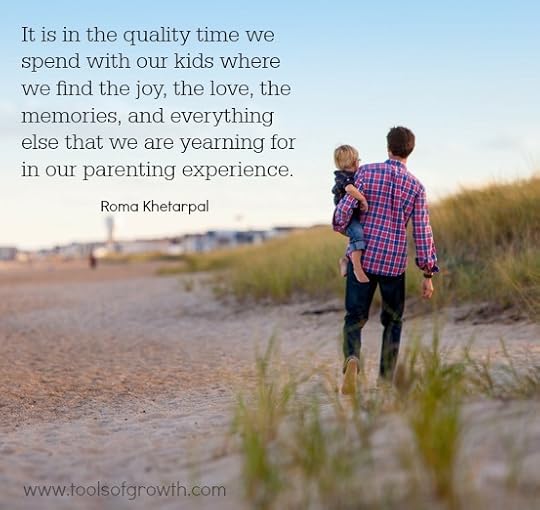
I was doing my meditation practice this morning, and my mind was a busy bee. I would manage a few blank seconds, then my mind would drift again. I’ve sharpened my awareness over the last few years of dedicated practice, so I notice within a few seconds when my thoughts float off. And I’m usually good at gently pulling it back to a quiet, blank space.
Not this morning! With a ton of workshop proposals, prep for an upcoming lifeguard training, detailed planning for the launch of a new TOG platform (watch for a surprise), packing for a summer vacation with the family (yay!), and entertaining favorite cousins from India, my mind had no shortage of places to drift to.
That continued after my meditation, too. As I jumped on the treadmill to exercise, I noticed my mind wasn’t in sync with my physical movements. And when I hopped into the shower, my mind kept flowing elsewhere. I barely noticed breakfast as I thought about worksheets for the lifeguard program. And when I looked at my watch, I couldn’t believe it was time for my parent consultation. I shouldn’t have been surprised when the first thing the mom said to me was this:
“You were right. I do have trouble being present with my kids. The mind-watch assignment you gave me on Monday was maddening. I tried taking five minutes of quiet time and watching my breath. That was hard, but I could catch moments of blankness, and I know how relaxing that feels. I could watch my mind throughout the day as well. I noticed I was doing laundry but thinking about dinner. And when I was making dinner, I was thinking about my grocery list. As I made my grocery list, my mind drifted off to what I needed to buy my nephew for his birthday. I could actually observe all that and really worked on bringing my attention to the task I had started. I aligned my attention and my action—as you suggested—as best I could. I might not have been successful every time, but I definitely got what you were pointing to. It’s crazy that we do all these things with our body while our attention moves elsewhere once we’ve started a task. But that was not the maddening part.
“The minute I headed to school to pick up the kids, my mind seemed to pick up the speed of an express train. I no longer was noticing the way my mind was floating. There was no noticing anything anymore. It was 7 p.m. before I realized that I hadn’t noticed anything for four straight hours! When I reflected back, I realized that the only moment that I was really present was when my kids got into the car after school. The minute the door shut, I remember looking back, smiling, and asking the kids how their day was. At that moment my mind was with my body. After that, I really don’t know.
“Yesterday, I made a concerted effort to watch my mind while I was with the kids, and, honestly, I couldn’t. One minute they were fighting, the next I was screaming to get homework started, and the moment after that I was screaming that it was bath time. Then we had dinner. I remember what I did, but I do not remember what each task felt like.”
This is what we all confront in our daily lives. It is simply the nature of the mind to float on to the next moment before the current one is over. Most of the time we are not really “present” in what we do. Even when we are eating, we are often glued to our phones or our mind is elsewhere. Yet this multitasking, as we call it, does not, repeat does not make us more efficient. It’s not beneficial to the well-being of our physical bodies because our physical bodies cannot keep up with the speed of our minds. Research tells us that multitasking is not a healthy habit. It induces stress, anxiety, and depression. Worst of all, it is detrimental to our relationship with our kids.
The word “quality” is defined as “the degree of excellence of something.” It points to the experience we have when we are with our kids. There is no excellence or experience when we do not align our mind with the task at hand. This doesn’t mean that we should not do the things that we need to do for our kids or with our kids. It simply means that the quality of the time spent with our kids is determined by the state of mind we are in at that moment.
So how can you harness this? By working on clearing your mind of other things while you address the task at hand. Only then will we find a deeper connection with our kids. We will find the “quality” in even the smallest of quantity of time we spend with them. This is why I advocate the tool Take 5 from my award-winning book, The “Perfect” Parent. Unless we practice Take 5, we cannot dial into the feeling of sharing space with our kids without a to-do list in our minds. With summer around the corner, take five minutes each day to work on this. I promise you, a little practice will take carry you through a lifetime of great relationships.
When all is said and done, our kids will remember less of what we did for them and more the quality time we spent with them. We cannot and should not spend a lifetime raising our kids without experiencing what quality time actually feels like. Because it is within this feeling that we find the joy, the love, the memories, and everything else that we are yearning for in our parenting experience. It is within this feeling that we find quality in our relationship with our kids—and all of life itself.
If you’d like to be updated on new blog posts and events, we’d love for you to sign up for our mailing list.
The post Do You Spend Quality Time With Your Kids? appeared first on Tools of Growth.
May 16, 2018
Peer Pressure or Peer Influence?
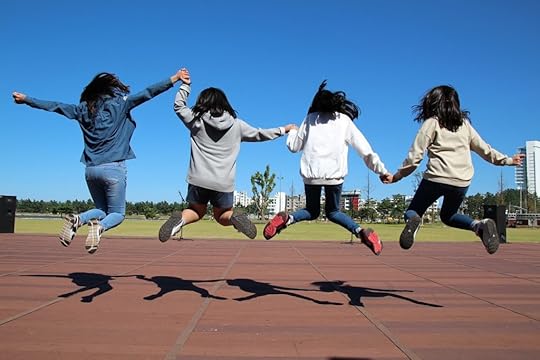
“Mama, Jackie, Saira, Carina, and I have decided that we will all be Belle for Halloween this year! I’m so excited. Can you order my outfit now?” asked 8-year-old Jasmine on Mother’s Day.
“Everybody wants to be Belle, sweetheart. Why do you want to do what everybody else is doing? You should be different and pick something unique,” answered her mom.
“Dad, I’m going out of state for college,” declared John at the end of his junior year.
“I’ve changed my mind about staying in California, because everybody is going to be going away.”
“Well, that’s not what we had decided, and I’m not spending thousands of dollars on travel over those four years, John. You need to pick a school in California,” snapped his dad.
Here we go again! thought John’s mom, rolling her eyes but biting her tongue to avoid conflict. He wants to do what everybody else is doing. I hate that about John! He’s so easily influenced.
Whether our kids are 8 or 17, there’s no question that they’re influenced by their peers. And as parents, we try to steer them away from what we wrongfully term “peer pressure.” Our intention, of course, is to guide our kids to make decisions that fit their own likes, dislikes, personality traits, and ability to succeed. But what do we do when we hear statements like Jasmine’s or John’s? We snap. We judge. We assume that their comments are influenced by others, though more often than we like to admit, we’re annoyed because what they’re contemplating is not what we think is right for them.
Where does this take us? To unnecessary conflicts, arguments, and chaos—all of which hinders our children’s self-reliance, damages our mutual trust, rocks the relationship, and creates unwarranted emotional turbulence, both individually and collectively.
Let’s take a look at each of these results one by one.
Hinders self-reliance. On the one hand we want our kids to be in-dependent—dependent upon themselves. On the other hand when they declare independent choices, we are immediately ready to steer them away from those decisions, just because we feel they were under “peer pressure.” So we poke them to move in a different direction with comments or sometimes sarcastic or snide remarks. When we do that we are risking …
Damage to our mutual trust. It is in our human nature to constantly want to grow by our own experiences and impressions. However, when kids express those impressions, and parents shut them down, the kids are less likely to come to us to discuss any issues in the future. Kids will say, “I don’t want to talk to you about this,” or “You don’t understand,” or “It’s different than when you were a kid.” These statements really translate to “I don’t trust that you understand me or will listen with an open mind.” If this situation continues it will definitely…
Rock the relationship. Relationships with children do not get rocky because parents disagree with children. Kids need our opinions, which is why they speak their mind before making decisions. What rocks the relationship is our harsh tone of voice, derogatory or sarcastic remarks, or blatantly shutting down our kids’ comments without considering where they are at the moment. If we follow this pattern frequently enough, we will undoubtedly end up with…
Unwarranted emotional turbulence, individually and collectively. If you’re arguing with your kids over anything and everything— as most parents complain they do—you are caught up in emotional chaos. When emotions are in the way, communication is not only affected but actually ineffective. Relationships are built only when we take charge of our own emotions so that we can not only help our children balance theirs but role-model how to do that.
So what should we keep in mind in responding to our kids’ comments?
Give them freedom to be influenced while guiding them to their own strengths. Most of our decisions are inspired by others. It’s natural that when someone says something that appeals to us, we are inspired to do follow along. If you feel your kids are influenced by others, know that it is not always a bad thing. In fact, the only time that you need to issue a warning is when drugs, alcohol, or other life-diminishing temptations are involved.
Meet them where they are. Think back to when you were their age; how many times were you influenced by others and thought you would do something but never followed through? So listen without judgment or response. Let your kids finish their thoughts and complete their sentences. Let them sit with their decisions or comments without any refutation from you.
Give them space and freedom of thought and expression. Try statements like, “Sure, if that’s what you want.” What real difference does it make if your 8-year-old ends up dressing as Belle or the Beast for Halloween? Pick your stands when they matter—with the big stuff. And if your child is entertaining going out of state for college, let him or her consider it, especially if the idea is not detrimental and is not taking place in the immediate future. Think how spreading their wings will enhance your children’s growth and life skills. The fact is, most kids don’t know what the right decisions will be for them six months or a year ahead. They live in the now and decide what feels right for them now. Whereas we parents jump ahead and are mentally prepared to immediately squash their passing thoughts and comments.
Parents today are involved with their kids more than ever before. That is why terms like “helicopter parents” and “authoritative parenting” have come into the conversation. However, no growth or good comes from helicoptering humans, especially little ones who are trying to grow and expand. Parenting requires a gentle hand. It demands that we be lighthearted and lenient, not threatening or overly scrupulous.
Our kids are on a journey of self-discovery, and being influenced by peers is very different than being under peer pressure. This is not pressure that is steering them away from themselves. It is simply an influence that helps them entertain choices that are different from those they have made before.
Become conscious, pay attention, be mindful of the motivation behind your children’s comments, and nine out of ten times you will notice that they are being influenced not pressured. It is our constant judgments, rebuttals, and unnecessary comments that teach our kids the art of argument. It is our constant disconnection from understanding their innate desire to grow and expand that teaches them the art of disconnection.
The post Peer Pressure or Peer Influence? appeared first on Tools of Growth.
May 11, 2018
How Have You Grown Since Your First Mother’s Day?
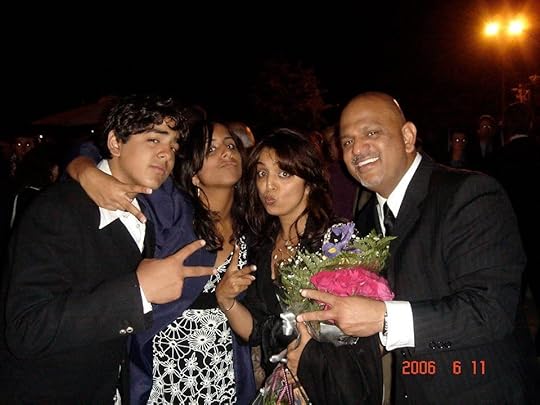
“I can’t believe how big my kids are all of a sudden.”
“I’m sad they’re not babies anymore.”
“My son’s first word was spoken on Mother’s Day—and it was “papa.” I’ll never let him live that down!”
“I remember the day that I became a mother like yesterday. My son was the sweetest gift I ever received.”
“This is my 14th Mother’s Day! Yikes, my kids are growing up way too fast.”
“By next Mother’s Day, my daughter will be off to college. How much she’s grown.”
Somehow every year, around Mother’s Day, our flashbacks and reflections circle around our kids. For me, this was a big year. My daughter turned another decade, and even though I’m not very big on numbers, I did sneak a peek at her baby album and almost immediately felt an overwhelming sense of nostalgia. She was such a beautiful baby—peaceful, serene, and disciplined. She was sleeping six hours a night at five weeks. Every new mom’s dream!
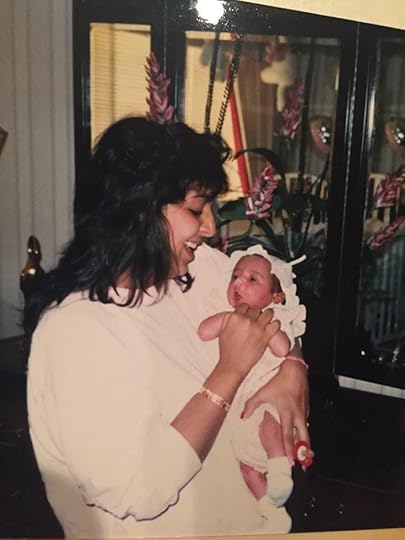
I couldn’t help but feel that time had flown by at lightning speed. Then I noticed another album picture of me with a semi-frown on my face. There were wrinkles between my eyebrows. In an instant, I remembered that I had been really angry at my mother-in-law. She had been telling my sister not to take so many pictures, to let baby and mom rest, and that too many flashbulbs were not good for the baby anyway. I remember being very ticked off about her comments. I also remembered my mom sharing an old wives’ tale about not taking pictures when a baby was sleeping.
I had two moms involved in my life, and they constantly kept me on a roller-coaster of emotions. I was always anticipating the next “advice” I was going to get. Now I can giggle about how I would let them get under my skin and how my emotions would be triggered by their “guidance.”
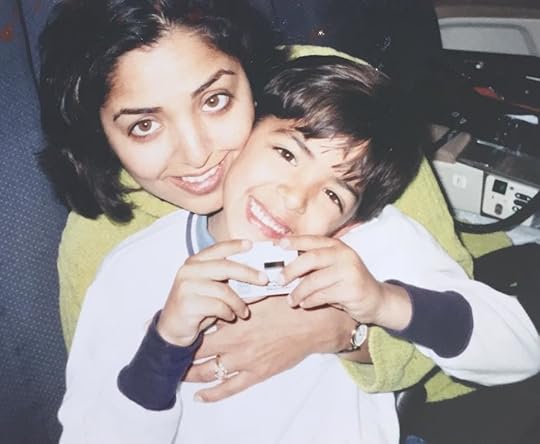
Thirty years later, I still have my two moms. One lives in our house and the other is not far away. They haven’t changed a bit. But I have. Looking at those pictures reminded me how much I have grown up and made me think about some differences. I grabbed a pen and my diary and jotted down my thoughts. Here’s what I came up with:
Patience – up 100 percent
Tolerance – up 200 percent
Judgment – down 99.8 percent
Expectations – down 100 percent
Noise in my head – down 50 percent
Enjoying the moment – up 200 percent
Complaining (internal) – down 100 percent
Self-awareness – up 500 percent
Emotional Intelligence and Management – up 2000 percent
Respect for the gift of life – up 2000 percent
And what were the biggest reasons for such growth?
I thought deeply about that for a little while. Here they are:
My kids are my biggest teachers. This is the most important life lesson, which is of the utmost necessity for every parent’s growth.
I’ve had years of life experience. When you’ve been a parent for 30 years and have seen three decades of life and death and everything in between, clarity is a by-product. We come to understand what’s really important, and we let go of the small stuff—not just with our kids but with the rest of our family, friends, and peers as well.
But most importantly, there’s Emotional Intelligence and Emotional Management and my conscious connection with life. As I became more emotionally intelligent, I was able to manage myself, my kids, and all my relationships more effectively. Not paying attention to my emotions was my biggest hurdle and challenge. I was good at not showing my emotions to others, and so you would never know when or by what I was hurt. But, oh, did that create havoc for me on the inside. Identifying my feelings, validating them, and then allowing them to pass through both non-judgmentally and non-reactively was a skill I had to learn, and it has served me well.
Next, I started to become aware that I am surrounded by and synchronized with the energy of life in everything I do, touch, and feel. That was life-changing. The trees in my yard breathe life just like I do, and we have a perfect contract of exchange—I breathe out CO2 for them, and they breathe out oxygen for me. It’s perfect! Clouds move through the sky, just as I have clouds of emotions that move through me. Water has a flow just as I do—after all, I am 70 percent water. I share the air that I breathe with every plant and animal around me, including my kids, relatives, family, friends, peers, and every other human being on the planet, whether I know them or not. And as I became more aware of being part of the larger puzzle called life, I tapped deeper into my human potential. This has propelled my growth many times over! For me, this single revelation—of becoming conscious of the life that not only surrounds me but also supports me—has been the driver of my growth in compassion, kindness, empathy, respect, and love. This is what has shone brightly in my relationships and my work. Best of all, it has deepened my friendship and connection with my kids. Now, who doesn’t want that!
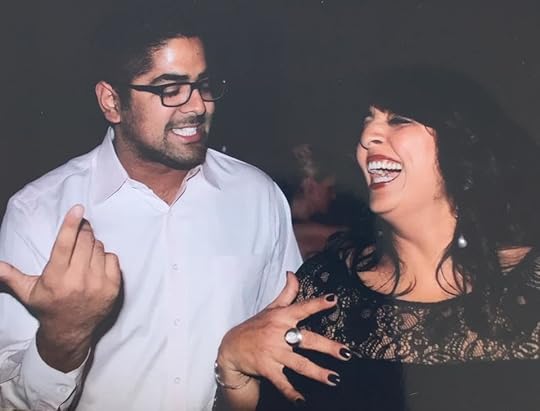
And so what started out with a few family photos has led to self-reflection and revelation that has left me not just joyous but over joyous. It has brought immense clarity on what I need to do more of.
For Mother’s Day, we would love to hear your top-of-the-list propellers of growth. Let’s share our revelations and be inspired by each other. What do you feel has helped you grow the most—both in this last year and since you became a mom?
Happy Mother’s Day to all you lovely mamas out there!
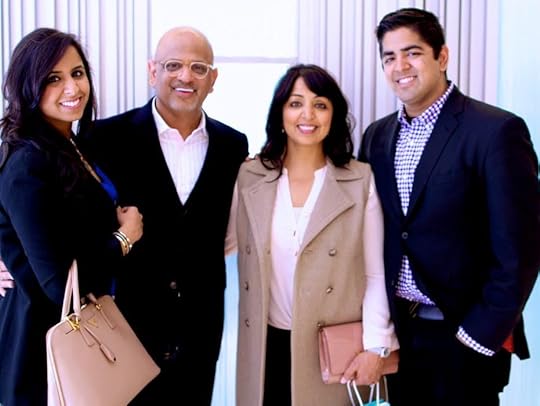
The post How Have You Grown Since Your First Mother’s Day? appeared first on Tools of Growth.
May 3, 2018
The Secret Sauce: Keeping Our Children’s Confidences

My daughter was eight years old when “secrets” became a thing in our family. Nitasha would tell her dad a secret and ask him not to tell me and vice versa. We were all caught up in this—including her grandparents.
There was one weekend, though, that one of her secrets had broader implications. When I picked Nitasha up from school on a Friday afternoon, she whispered, “Mom, I want to tell you a secret! But you have to promise not to tell anyone!”
“Sure, Tash,” I whispered back. “What is it?”
“Jenna found $20 in her dad’s drawer, and she borrowed it,” Nitasha confided. “Today, she shared $5 each with Shelly and Nina and me, and we’re all going to buy matching lip gloss with the money! Can we stop by the mall so I can buy watermelon lip gloss?”
No! I thought to myself. We are not buying watermelon lip gloss with stolen money! Why is Jenna ‘borrowing’ money from her dad’s drawer anyway?” But of course, I knew our kids’ trust had to be handled with kid gloves (pun intended). So I decided to use my favorite buying-time line: “Let’s plan on doing that tomorrow. I need to think about this a little.”
Though this might seem misleading—as though I were committing to a shopping trip the next day—when it comes to handling a child’s trust it is imperative to think things through.
When Nitasha was in bed, I revisited the issue. It was clear that I had three choices:
First, I could tell Nitasha that we were not having any part of this, that the money had been “borrowed” without permission and Nitasha had to tell Jenna that and return the money to her. It would be tough, but I could help Nitasha phrase this as, “I was thinking about this, and it doesn’t seem right to me. Here’s the money back, and I think you should tell your dad because he could think that you stole it.”
I would explain to Nitasha the difference between “borrowing” and “stealing.” Lesson learned for her. As for Jenna and the other girls, I could chalk it up to “not our business” and keep the trust intact between my daughter and me. I felt this would be an empowering learning lesson for Nitasha and enable her to handle her own issues with friends in the future.
My second choice was to tell Nitasha that I was going to pull Jenna aside when I picked her up from school on Monday and talk to her myself, guiding her to do the right thing by asking her friends to return the money and then giving it back to her father. She’d also have to tell him the truth about “borrowing” the money. In this case, I was risking Jenna’s being upset at Nitasha for telling me the secret, but this option would empower Jenna—practically force her actually—into taking the proper steps.
My third choice was, of course, to talk to Jenna’s dad directly and let him know what had happened. This would be the most volcanic option; there was no telling how he would handle the situation or how Jenna might react to Nitasha. In this case, I risked Nitasha’s friendship, and it might cause Jenna and the other girls to exclude Nitasha from their group or even calling her a tell-tale.
As I thought through these scenarios, it became clear that the first choice was the right direction, especially because it would give Nitasha an opportunity to learn how to approach such situations in the future.
So the next morning, as the kids lolled around the house enjoying their lazy Saturday morning, I pulled Nitasha aside to discuss the three choices. I wanted her involved in the decision making. As I rolled out the options, her eyes popped with fear, but I asked her to simply listen. I told her, “I’m with you on this, and we will work this out together.” Being her mother’s daughter, Nitasha asked if she could think about this and get back to me in a little while. Kids are a lot smarter than we give them credit for. I loved that she was buying some time to think this through.
About an hour later, she came up to me, ready for the discussion. “How about I talk to Jenna but have you standing by my side,” she said, “in case I get scared or Jenna gets upset? Because if she gets upset or scared, I wouldn’t know how to handle it.”
I thought it was brilliant that she chose to fuse my first two choices, knowing her own emotional limitations. Over the weekend, Nitasha became even more convinced that this was the right thing to do, and I applauded her for making her own decision, even though it was a tough one.
Monday morning we got to school early, as we were walking to find Jenna on the playground, Nitasha surprised me again, by asking if I would stand a little distance away. I could see she was prepping herself for handling this alone with the least involvement from me. When she found Jenna, she pulled her close to the wall, keeping me at arm’s length. To make things a little easier, I turned my back to them as they started their conversation.
But I could hear Nitasha whisper to Jenna, “I wanted to talk to you in private about our lip gloss pact. How do you feel about borrowing the $20 from your dad’s drawer without him knowing?”
“Not really good,” Jenna replied, “I was scared all weekend that he would find out and I would get into trouble. I couldn’t sleep on Friday, but I was too scared to tell him since I had already given the money to you guys.”
My eight-year-old shocked me with her response: “My parents always say to listen to your heart first, and I should have listened earlier and told you to return the money. I’m sorry that I didn’t. When I asked my mom to take me to the mall, I felt in my heart that it wasn’t right. I’m giving you this money back, and you should get it back from Shelly and Nina, too. Then please tell your dad that you “borrowed” this money by accident, and I promise you will get into less trouble than if he were to find out on his own.”
In a teary voice, Jenna said, “You’re right, Nitasha. I’m going to do that. I’m scared, but I will do it. Please tell your mom not to tell my dad. I want to tell him myself.”
That evening, Jenna called to say that she had told her dad, and, although he was a little upset at first, most of all he felt proud and happy that Jenna had made the right decision.
“She’s not even getting grounded, Mom!” Nitasha related. “The truth does make everyone’s heart happy!”
If we give our children the opportunity to help resolve their own issues, they learn a life skill through personal experience. Not only did I feel good about how bravely Nitasha handled this, I also realized how empowering it is for our kids when we guide the way instead of always leading. Our kids are a lot smarter than we think they are. Most importantly, Nitasha, Jenna, and I experienced the power of human connection. When we put our energies together, we have infinite potential to resolve issues and communicate fruitfully. We also all learned the magic in empathy, kindness, courage, and forgiveness, while deepening trust at the same time.
What’s the secret sauce? Empower your children. Guide and step aside.
Which choice would you have made first? Do you have a story about “secrets” that you or your child learned from? Please share so we can all learn together!
The post The Secret Sauce: Keeping Our Children’s Confidences appeared first on Tools of Growth.
April 24, 2018
Our Newest TOG Workshop: Mindfulness Training for Bus Drivers
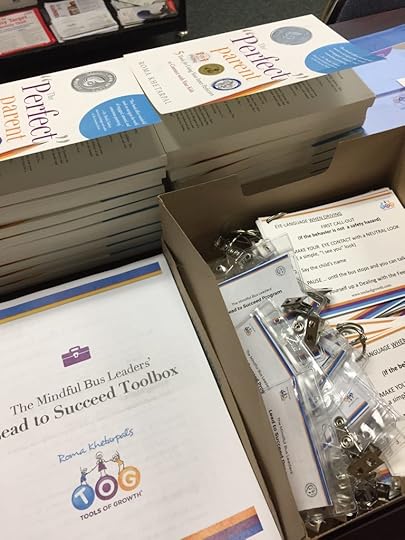
It’s been quite the ride for Tools of Growth since September 14, 2014. Publishing my book, The Perfect Parent was like giving birth to a beautiful first child. As a first-time author, like a first-time parent, I did not know what to anticipate. I had no preconceived notions about what would happen next, and I consciously decided not to read blogs or “what to expect” advice for new authors. I just jumped in with a heart full of passion.
As most of you know, over the course of the last three years, the book has won several awards, honorable mentions, and endorsements from renowned experts. But what I was swept away by most was that this book gave rise to a lineup of school and educational programs. This was neither planned nor expected. It is true that life is full of surprises, and no one likes surprises better than me. So when Dr. Joan Lucid at Saugus Union School District hired TOG to create the very first SEL, emotional intelligence, and mindfulness training program for recess staff (called the Mindful Play Leaders’ Lead to Succeed Program), I had no idea where this would take me.
I am humbled and excited that in just a short three years, six programs have emerged from one book:
Recess staff—Mindful Play Leaders’ Lead to Succeed Program
Before- and after-school staff—Mindful Play Leaders’ Lead to Succeed Program
Teachers—Mindful Teachers’ Lead to Succeed Program
School administrators and management—Mindful Leaders’ Lead to Succeed program
Junior lifeguard instructors and camp counselors—Mindful Junior Lifeguards’ Lead to Succeed program
I did say six, didn’t I? Yes, the sixth one took me by surprise as well. Sulphur Springs Union School District contacted me to create a program for their bus drivers! When Michelle Gookins, the Assistant Superintendent of Business Services, first mentioned this, I almost fell out of my chair. Why had I not thought of this? Creating these programs has been fulfilling and gratifying, but designing the Mindful Bus Drivers’ Lead to Succeed Program has been the most fun so far.
As part of the data-mining process that goes into these programs, I asked to go on a couple of bus rides so I could really feel the bus drivers’ pinch points and understand the challenges they face with kids. I did an early morning ride on a special ed bus, and it was really interesting to note the slump that all children experience getting on the bus as early as 6 a.m. Yet even on a quiet dark morning, kids found a way to argue and tease. There were only eight children on this small bus, so despite the smart remarks, teases, and nudges, things weren’t really that bad. And now I can believe that bus drivers really do have eyes in the back of their heads!
The next day I got to ride a bus after school. That was a one-of-a-kind experience for my poor ears. The sound in the bus leapt from zero to one hundred in just a few seconds. It reminded of what happens at a Laker Game when an unexpected basket is scored. Now hold that noise for one hour, and, yes, that’s exactly what a bus ride with 65 children sounds like.
Needless to say, I walked away with tons of examples and data. But most of all, I walked away with a newfound respect for the challenging job that bus drivers do. Facing forward, keeping safety first and foremost, these valiant human beings are committed to getting noisy rambunctious kids to their stops safe and sound.
To all the parents who worry about their children riding the bus, let me assure you that although these dedicated leaders might occasionally lose their cool or feel “mean” to the kids, they do so to protect them—to ensure their safety. To prove my point, I’d like to share some eye-opening facts that I learned during the making of the Bus Drivers’ Lead to Succeed Program:
There’s a huge effect on the environment
One single bus is the equivalent of taking 36 cars off the road.
More than 17 million cars would be needed to transport students currently riding on all the school buses in the United States.
As much as 20-30 percent of morning traffic is generated by parents who drive their children to school.
There’s a huge effect on health
Switching from diesel fuel in buses to propane has proven to be 15 percent better for the environment and health.
Children exposed to traffic pollution are more likely to have asthma, permanent lung deficits, and a higher risk of heart and lung problems as adults.
One-third of the schools in “air pollution danger zones” are rated that way due to their proximity to high-traffic areas.
There’s a huge effect on safety
According to the National Safety Council, every day more than 25 million children ride one of 480,000 big yellow buses, yet school buses are among the safest modes of transport—safer than riding in a family vehicle or walking.
The National Highway Transport and Safety Association (NHTSA) notes that from 2004 to 2014, U.S. drivers were involved in 340,039 fatal motor vehicle traffic crashes. However, only 4 percent of those were “school transportation related.”
Students are 70 times more likely to get to school safely when taking a school bus than when traveling by car.
Not only are buses safer for the environment and our children’s health, they are the safest mode of transportation for our children! Of course, the government and bus manufacturers contribute to the benefits that buses have. But where safety is concerned, all credit goes to the bus drivers. It’s because of their care and dedication to our kids that we can cite such amazing statistics.
I am honored to be able to equip school bus drivers with tools of emotional intelligence and mindful communication to help enhance the great job that they already do!
If you’d like to bring this training to your school, feel free to contact me at roma@toolsofgrowth.com
See what Roma has to say about the program.
The post Our Newest TOG Workshop: Mindfulness Training for Bus Drivers appeared first on Tools of Growth.
April 17, 2018
Build and Strengthen Communication With Your Kids
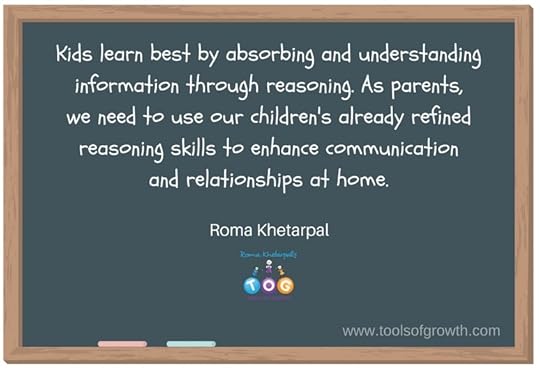
Times have changed.
Our children are part of a generation that is being raised on the information superhighway. Through search engines or social media networks, it seems that the answer to their every question is at their fingertips. They know how space shuttles work and why revolutions happen in other countries. Both on the web and in their academic institutions, they are used to absorbing and understanding information through reasoning. That’s really how they learn best. In fact, reasoning is how most of us learn best. Now we parents just have to focus on using our children’s already refined reasoning skills to enhance communication and relationships at home.
Whether you are a parent of a young child or a teenager, being reasonable and response-able will help you build and strengthen communication habits. And if you are pregnant or have an infant, be forward thinking. Start instilling this good communication habit by practicing it with your spouse, family, and friends. It will benefit you in the long run with your children – plus, it will strengthen your communication with your other loved ones, too.
All parents share a common goal of teaching kids to respond to life thoughtfully instead of simply reacting. Well, that training and guidance has to start with the parents. If making these sorts of changes seems hard for you, look at it as a challenge to better your family life and to strengthen your children’s self-confidence. It is a matter of committing to balanced communication – in this case, through reasoning and responding. And when you go off track, breathe deeply, hydrate, cool off, and then take a minute to reflect, redirect, and reconnect. As Peggy O’Mara, former editor and publisher of Mothering magazine, says, “The way we talk to our children becomes their inner voice.” Indeed, our responses and expressions leave lasting impressions on our children. The importance of these impressions cannot and should not be underestimated.
Excerpt from: The Perfect Parent: 5 Tools for Using Your Inner Perfection to Connect with Your Kids.
The post Build and Strengthen Communication With Your Kids appeared first on Tools of Growth.
April 9, 2018
Cookie-Cutter vs. Out-of-the-Box… What Kind of Children Do You Want to Raise?
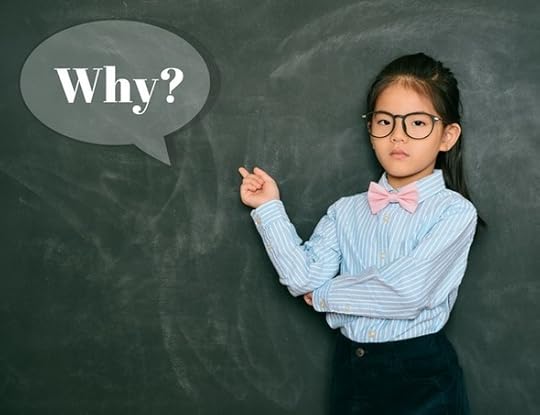
“What kind of kids do we want to raise?”
Of course, we all want kids who are happy, think positive, and do good! That’s why it’s our Tools of Growth tagline. Furthermore, we want our children to be successful, resilient, confident, and courageous, as well as kind and forgiving. I believe all parents have that same vision for their children. Here’s the hard truth though: That’s not the result when we drive our children toward mainstream goals like getting the best grades, dressing the best, or being the best speaker on the debate team or the best athlete on the field. If we are simply encouraging our kids to fit into predefined and preconditioned societal boxes, aren’t we simply raising cookie-cutter kids?
My daughter was six years old when she started questioning preconceived ideas. It started with rituals that my mother-in-law followed in her morning prayers in our home-temple room. “Why does grandma light a candle?” my daughter asked. “And why do we close our eyes and fold our hands to pray?”
That led to other questions like, “Why do we have to stay in each grade for one year?” As she got older, she would ask why teachers got to grade her work, but she couldn’t grade her teachers in return. She had definite opinions: Miss ABC was an A+ teacher, because she was “great, kind, loving, and smart,” but Miss XYZ rated a D- because she was “never smiling, had a mean tone, was always angry at some kid or another, and didn’t explain math properly.”
Our kids leave us stumped when they ask out-of-the-box questions like these. Not only did my super-attentive child make sure that I brought my A-game to parenting, she challenged me to seek answers to questions that I had never asked before. She made me dig deeper into the meaning of the rituals that I had inherited and blindly followed. Her questions forced me to grow.
I personally couldn’t get myself to say things like, “Well, that’s just the way it is,” or “That how we do it.” Instead, I found myself exploring the causes of our actions in order to answer her curiosity, which then became mine. I found out why eyes are closed during prayers and why candles are lit in temples. Those discoveries touched my soul and deepened my understanding of myself and my connection with what I did. In many instances, I actually did away with rituals that did not make sense—which helped me keep the things that added meaning to my life.
However, there were times that I could not answer her questions intelligently. For those questions that befuddled me—why do we have to stay in a grade for one year, or why can’t students grade teachers—I responded honestly with “I don’t know.” And I followed that instinctively with, “If you got to decide, how would you do it and why?” That invariably led to some imaginative, out-of-the-box suggestions: Every teacher should go home with a report card of how they did that year. Students should be allowed to complete a grade in 6 months or 18 months, depending on their capacity to learn!
No, my daughter did not quit school nor did we home-school her. She never got to grade her teachers, and she did not refuse to light a candle in temple. In fact, she thrived as a student and dug deep into many religions. She even started an interfaith council chapter at her university. She persisted in her ability to question who she was and what she was doing at all times. She pursued lengthy academic studies in college and graduate school, always maintaining her out-of-the-box thinking and intellectual explorations.
We go on autopilot when we stop asking why. When we conform without understanding, we become cookie-cutter individuals. When we hit repeat or auto-play and do the same things every day—without questioning why—we are merely on a hamster wheel. Who wants to raise kids like that?
Peter Abelard said, “By doubting we are led to question. By questioning, we arrive at the Truth.” We open up our children’s minds by being open to their questions. As kids, they may start out with the simple questions about what we do and how and why we do it. And that may lead to the exploration of life itself—who we are, why we are here, how we are the same, why we are different. We all want to set our children on this path to explore the truth of their own existence. This definitely held true for my daughter. She is still a beacon of curiosity—exploring her external and internals worlds every day, finding meaning and purpose in the relationships that she builds and the decisions that she makes.
It all starts with curiosity. Curiosity shines light on our human habits, urging us to explore.
Exploration is the portal to learning. Learning is the fuel that fires growth. And growth makes life more meaningful and joyful.
So when your children start asking “Why,” explore those questions with them. Step outside of the box with them. And push open the doors of creativity, imagination, innovation, and self-discovery!
First published on Huffington Post.
The post Cookie-Cutter vs. Out-of-the-Box… What Kind of Children Do You Want to Raise? appeared first on Tools of Growth.
April 2, 2018
Are You Ready For Kids?

Are you ready for kids? Can you afford them?
What is the only thing that you should plan for?
These days the average age of a first-time parent has jumped significantly! This is the oldest generation of parents to have ever existed. We can assume that this group is more mature and therefore more prepared for parenting, with a clearer understanding of what it takes, right? Why, then, are these two of the most frequently discussed questions at parent forums, blogs, and in social media: 1. Are we ready for kids? And 2. Can we afford kids?
Let’s take these one by one…
“Are we ready for kids?”
No matter how prepared you think you are, you are never ready enough! When it comes to parenting, that’s the simple truth. How can one predict the nature of a completely separate human being? It’s hard enough to predict what children will be like from stage to stage, how can one anticipate “all of it”? For that matter, we can’t know how ready we are for anything in life before it happens.
The only sure thing as you enter the unknown world of parenthood is that parents can prepare their environment to provide their child’s needs and comforts. They can do what needs to be done for the physical care of the baby, but how they will “be” with the baby or how the baby is going to “be” can never be known in advance.
So what can you do to be ready internally? Trust yourself and life. Know that your path will unfold, and you have limitless potential to respond to it. Remember that you are living this life because you are strong enough to live it. If you weren’t, you wouldn’t be entertaining this question ― subconsciously or consciously. Also know that as you enter parenthood, you will never be the same again ― in a great way!
“Can we afford kids?”
This is a delicate question, as unpredictable as the first. Yes, you can set up a budget for expenses like a crib, bedding, diapers, formula, clothes, and sundries, but you never ever know what else might arise. One mom I met in a workshop told me that her autistic son has cost her family $100K in therapies, and they are amazed how these unanticipated expenses have been accompanied by two big promotions for her husband in the last year. Another dad told me that the birth of his son inspired him to quit his job and stay at home to care for the baby. He was shocked that he and his wife are managing just fine financially.
As with anything in life, you cannot predict what you will be able to afford or not until you actually face it. Planning defensively robs you of the excitement that comes from expecting a baby—a beautiful experience of life that is short-lived, but oh, so fulfilling.
As a wise person once said, “As life has a way of unfolding as it is meant to, I have learned to trust life.” So let go, and trust yourself. Know that you have come this far by partly planning and partly responding to what simply shows up. When my husband and I bought our first home, we thought we would live there forever because we would never be able to afford another one. As it happens, we have moved three times in 15 years. My father-in-law always said, “Once you make a financial commitment, you will find a way to meet it. A good work ethic is all you need. The rest is a crapshoot.”
So now the big question…
“What is the only thing you should and can plan?”
Growth! Yes, that is the only unavoidable and inevitable life event. So if you’re going to prepare for anything, prepare for this. And know that you will grow just as much as your kids. They will nudge you, tug you, bug you, and challenge you from day one.
In the beginning, you may be challenged by not getting enough sleep or entertainment or being able to finish chores, but you will be amazed by your own ability to respond, and that will make you more patient and teach you to let go. As the children get older, they will nudge you to think outside the box (“But why?”), live in the present moment (“Play with me now”), open your mind (“You’re not always right”), and most importantly give up control (“You’re not the boss of me!”)
Always keep in the back of your mind that in this parenting ride you will be growing up along with your children. By the time they are adults, you will be more compassionate, kind, and empathetic. Your kids will raise you while you raise them.
You can prepare for this from the get-go very simply. How?
Start by being emotionally intelligent and mindful. Address feelings as they come up so that they don’t blow up in your face. We all know suppressed feelings have volcanic tendencies. Remember, guilt, doubt, fear, and worry are constant companions in parenting. Address them as they show up. Learn to sit with feelings and actually work through them until they lose their power over you. Feelings are impermanent. Like waves, they will ebb and flow. Know how to step back and not get on the emotional train every single time.
Know you have an infinite ability to respond and not react. That is a choice you can work on and exercise. Kids will give you plenty of invitations to get out of control. Knowing your own triggers and strengths will assist you. Most of the biggest challenges parents face are embedded in a lack of self-worth, self-confidence, self-respect, and self-love. Work on strengthening your emotional core, so you can bounce back quickly if needed.
Know your breath and its rhythm. Learning how to manage your breath will assist you in learning how to manage yourself and your kids. Whether through meditation, breath work, or pranayama, this skill must be developed early on. It’s the only skill that will bring you quickly into the present moment where your kids naturally live, and it’s the only skill that teaches you how to be emotionally intelligent, mindful, and acquainted with your connection to life itself. Your breath unites your inner and outer worlds—so that you are prepared for the growth that will come from this little teacher who is about to arrive in your life.
First published on Huffington Post.
The post Are You Ready For Kids? appeared first on Tools of Growth.
March 22, 2018
Is Parenting Really a Sacrifice?
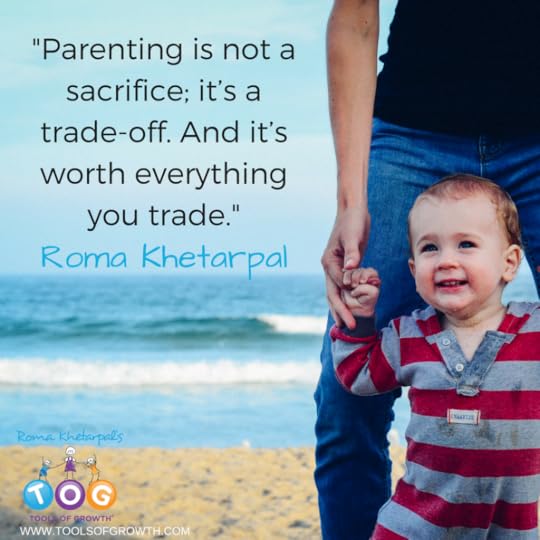
“I’ve sacrificed my whole life for my kids, and they still don’t appreciate me.”
“Parenthood has been one sacrifice after another. I’ve had to give up so much.”
“This is not a good deal! I’ve had to keep sacrificing, yet the family keeps asking for more. I have nothing more to give.”
In my parenting workshops and consultations, I’ve been hearing a lot of similar statements by parents. The word “sacrifice” is catching my attention a lot. Just last night, in a parenting consult, there was that word again! So as soon as it was over, I looked up the actual definition of the word “sacrifice.” Merriam-Webster.com supplied the perfect one with an example: “something given up or lost; the sacrifices made by parents.”
I couldn’t help but think about how this word really pertains to parenting. Yes, pre-parenting, this is what we enjoyed:
We could get up and go wherever and whenever we wanted to. We didn’t have to look for babysitters or family caretakers.
When we left the house, we traveled lightly. We only had to fend for ourselves.
The house was quiet and organized.
If there was no food in the house, we could eat four bags of chips and pop a can of Diet Coke or drive through McDonald’s.
Our to-do lists were based on own needs, wishes, and desires.
I don’t need to go on and on. You get the drift, don’t you? Indeed we made big sacrifices when we had children. We have “given up” or “lost” our overall independence and our freedom. But let’s look at exactly what that means:
We could get up and go wherever and whenever we wanted to. We didn’t have to look for babysitters or family caretakers.
We have given up self-centric behavior.
When we left the house, we traveled lightly. We only had to fend for ourselves.
We have given up caring only for ourselves.
The house was quiet and organized.
We have lost our need for perfection.
If there was no food in the house, we could eat four bags of chips and pop a can of Diet Coke or drive through McDonalds.
We have given up bad eating habits.
Our to-do lists were based on our own needs, wishes, and desires.
We have given up spending all our time on ourselves.
Isn’t it crazy that we call the growth that is inspired by the presence of our children a “sacrifice”? Have we really given up something or lost something without gaining something in return? Have we not grown to be better human beings—more caring, sharing, and dedicated. Haven’t we learned to how to let go and be healthier?
A sacrifice is one directional, but parenting is hardly that. What we consider a sacrifice is actually a golden opportunity for growth. If anything, we should be grateful for having our children in our lives. If it weren’t for them, we would be self-centered, self-absorbed, selfish human beings. Human beings are not designed to be stagnant and stuck. Our children bring change and evolution into our lives!
I know not everyone has children. For them, it’s important to stay inspired and motivated to grow, perhaps by being involved in arts, sports, or social events. As parents, however, growth comes organically simply by having kids and guiding them through this process called life.
So let’s do away with phrases like “I had to give something up.” Or “I had to sacrifice x,y, or z because of my kids.” Parenting is not a sacrifice. It is a truly fair exchange. For what you think you have sacrificed you are rewarded tenfold with growth. Most of all, you are rewarded a hundredfold with unconditional love, laughter, memories, and joy at your doorstep.
Parenting is not a sacrifice; it’s a trade-off. And it’s worth everything you trade.
The post Is Parenting Really a Sacrifice? appeared first on Tools of Growth.



